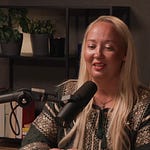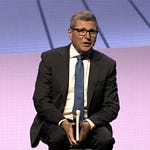In late October 2023, while filming the documentary Forged in Fire, I sat down with Ukrainian President Volodymyr Zelensky.
Our director/producer/cameraman, Michael Fardell, had asked the president’s office if he could do as much of the interview as possible in English, as we wanted him to speak directly to an Australian audience. His office was reluctant. This was no small ask because English is the president’s third language. Giving a prepared speech in it is one thing; making himself clear in an interview is another. The decision was left up to the president.
I decided to post this today because of the images that emerged overnight of Zelensky sitting down with US President Donald Trump at the Pope’s funeral in Rome.
It is good to see and, hopefully, some good can come of it. In their last, disastrous, meeting in the White House, Trump told Zelensky he had “no cards to play” in his nation’s war against Russia.
One of the reasons I found the White House confrontation so jarring was because I had seen Zelensky struggle to make himself plain in English. Imagine yourself in the same position when the stakes are so high. Imagine the frustration of trying to make yourself understood.
And I wondered if Trump had ever asked Zelensky why he, and his people, continue to fight, given in Trump’s view the cause is hopeless.
In the interview for Forged in Fire, Zelensky put it this way:
“What is a life? What is a life without any freedom, any rights, any democracy? When you can’t say what you want. Can’t choose how to live. What is it? It’s nothing.”
Freedom. That’s some card. Some might call it a trump.
The day after the interview with Zelensky we travelled to Borodyanka, about 50 kilometers northwest of Kyiv, which was heavily damaged during the first phase of Russia’s invasion in early 2022 and became a symbol of Ukrainian resistance and suffering. It was here we saw the Banksy mural of a young gymnast performing a handstand on the rubble of a bombed-out building.
So, hope hides in surprising places. We hope and pray for a just peace in Ukraine.
You can see our documentary here:
What follows was written in early 2024. Much has changed since then. Much stays the same.
The trouble with television gear is that so much of it looks like a rocket launcher or a bomb when viewed through a security monitor.
So getting 13 cases of it through presidential security is trying anywhere in the world, but in Ukraine the degree of difficulty stepped up a tier. There, for the first time, the tedious routine came with the overpowering sense that it was essential to bar the door to a mortal danger lurking outside.
It was late October and our documentary crew had driven to the same government office in the heart of Kyiv for three days in a row to interview officials and the First Lady, Olena Zelenska.
Inside was a shadow world. This once-grand building had life and light sucked out of it by war. The darkness built sandbag by sandbag, piled high against the windows. The second floor was almost pitch black, with only an essential few lights battling the gloom.
On the top floor we set up in front of a sweeping staircase, guarded by two soldiers who had radiation alarms clipped to their belts. Radioactive poison, after all, is a hallmark of their enemy.
When a light on the elevator indicated it had been locked off on the ground floor, it signalled our elusive interviewee was on his way.
Volodymyr Zelensky stepped out of the lift alone, wearing a familiar black skivvy with a subtle touch of blue and gold on the collar, and green combat-style pants. He had agreed to speak in English as we wanted him to talk directly to an Australian audience, half a world away. His message was simple: our nations were united by common values.
“You are closer than you think,” the Ukrainian president said. “During the war, there were a lot of countries who are closer than you to us but they didn't come to support our people.”
Whether you believe Australia should support Ukraine depends on whether you think this is a regional conflict or a frontline in the battle between tyranny and democracy. If it is a local war, then who wins matters little here. But if it is the tip of the spear in a fight over which worldview will define the 21st century, then what happens to Ukraine is vital to us.
In Vladimir Putin’s telling, Russia was provoked by the expansion of NATO towards his borders. It is a view that has traction here and in significant parts of the Republican Party in the United States. It is an argument I have heard directly from an adviser to former Russian President Dmitry Medvedev.
In his words, Russia complied with every US demand in the wake of the collapse of the Soviet Union, including abandoning its key listening post in Cuba, the “crown jewels” of its signals intelligence gathering. That, he said, was done on the understanding that NATO would keep its distance from Moscow — an agreement the US and Europe reneged on.
Putin laid out his grievance in a 2007 speech in Munich where he described the expansion of NATO as “a serious provocation.” The adviser told me he was in a closed-door meeting at that conference where a furious Putin told EU leaders, “You are forcing me into the arms of China, which is unnatural to me.”
But to accept this line means ignoring Putin’s 5,000-word pre-war essay, where he argued that Ukraine did not exist as a real nation. To buttress this, he rewound history to the 9th century and the shared heritage of Kievan Rus — an era that predates his grievance with NATO by a millennium. In it, Putin declared: “I am confident that true sovereignty of Ukraine is possible only in partnership with Russia.”
Putin has described the fall of the Soviet Union as the greatest geopolitical catastrophe of the 20th century and is bent on rebuilding a Tsarist Empire. His imperial ambition is embedded in the ideology of Russkii Mir (“Russian World”), aimed at exerting influence over states Moscow deems fall within its remit.
Speak to officials from the Baltic States and they have no doubt Moscow’s ambitions do not end with Ukraine. Estonian Prime Minister Kaja Kallas has accused Russia of waging a “shadow war” against the West.
So far, Australia and a Western alliance have stood with Ukraine, while Iran, North Korea and China stand with Russia. Beijing’s closeness to Moscow was underlined with a recent rare hug between a Chinese leader and a Russian president. They are now, quite literally, in each other's arms.
Putin and Xi Jinping share the same view of the West: that it is decadent, divided and in terminal decline. They believe their era is at hand and mean to take what they claim is rightfully theirs. That means reordering the world to make it a safe place for tyrants.
Recall that the Chinese Communist Party claims Taiwan — a country the Party has never ruled. Its illegal annexation of the South China Sea is based on a false claim that dates back to “ancient times.” It also has a diaspora of 40 million, referred to as the “Overseas Chinese,” from whom it expects loyalty.
Dictators can never rest until they gain a foothold in your mind. As Xi strives towards his “China Dream,” the first pain falls on his own people, who already live in a surveillance state. It will get worse as the demands from the rising Middle Kingdom ripple outward. Xi’s dream demands all criticism of him and the Party be silenced, at home and abroad. It demands that tribute states, like Australia, be separated from old alliances and live in the box that Beijing builds.
There have been countless failures by the United States and its allies in the handling of world affairs since the end of the last Cold War. But the deepest failure with tyrants like Putin and Xi is a failure of imagination — a failure to understand that their ambitions for the world cannot be reconciled with the one we would like to live in. Europe could not imagine another war. And war came.
I have been close enough to the frontline of that war to know what it looks like. It looks like Mordor. The loss of life is immaterial to someone like Putin because, in a dictatorship, only one life and one opinion count.
We are closer than we think to that war. A Russian victory would be a body blow to anyone, anywhere, who craves freedom. It would encourage Beijing in its quest to take Taiwan.
War has clarified what is essential to Zelensky.
“What is life?” he told us. “Without any freedom. Any rights. Any democracy. When you can’t [say] what you want. Can’t choose how to live. What is it? It is nothing.”















Share this post